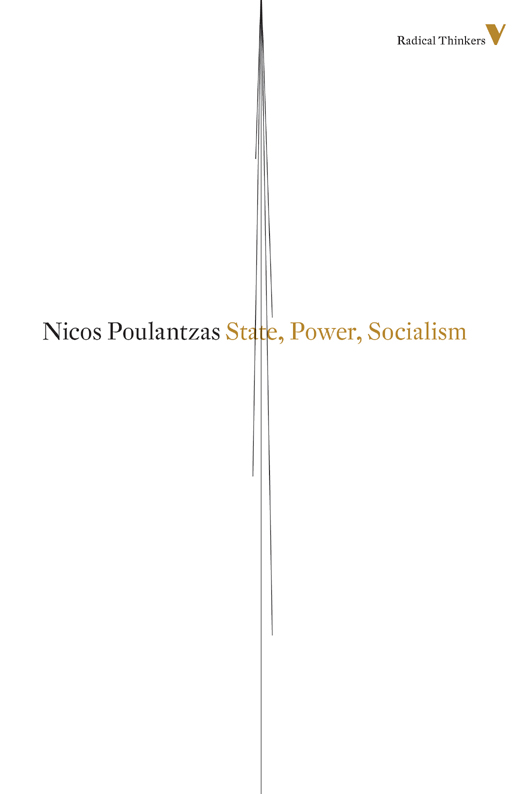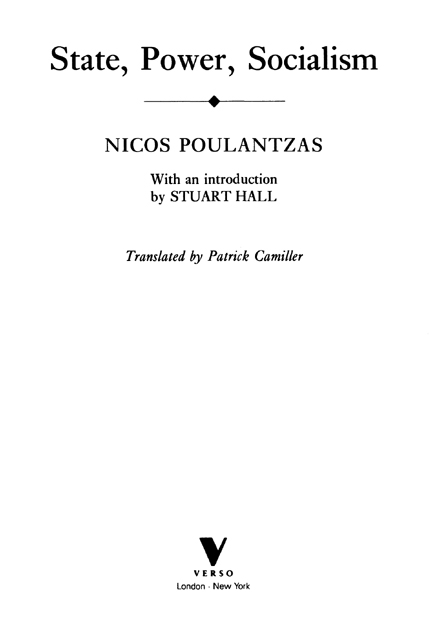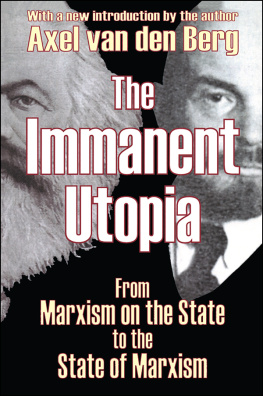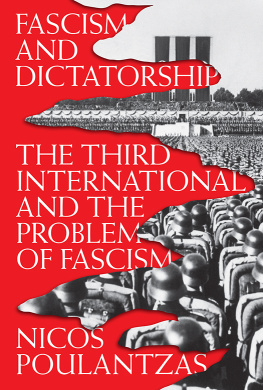Poulantzas - State, Power, Socialism
Here you can read online Poulantzas - State, Power, Socialism full text of the book (entire story) in english for free. Download pdf and epub, get meaning, cover and reviews about this ebook. City: London, year: 2014, publisher: Verso Books, genre: Politics. Description of the work, (preface) as well as reviews are available. Best literature library LitArk.com created for fans of good reading and offers a wide selection of genres:
Romance novel
Science fiction
Adventure
Detective
Science
History
Home and family
Prose
Art
Politics
Computer
Non-fiction
Religion
Business
Children
Humor
Choose a favorite category and find really read worthwhile books. Enjoy immersion in the world of imagination, feel the emotions of the characters or learn something new for yourself, make an fascinating discovery.

- Book:State, Power, Socialism
- Author:
- Publisher:Verso Books
- Genre:
- Year:2014
- City:London
- Rating:5 / 5
- Favourites:Add to favourites
- Your mark:
- 100
- 1
- 2
- 3
- 4
- 5
State, Power, Socialism: summary, description and annotation
We offer to read an annotation, description, summary or preface (depends on what the author of the book "State, Power, Socialism" wrote himself). If you haven't found the necessary information about the book — write in the comments, we will try to find it.
Developing themes of his earlier works, Poulantzas here advances a vigorous critique of contemporary Marxist theories of the state, arguing against a general theory of the state, and identifying forms of class power crucial to socialist strategy that goes beyond the apparatus of the state.
This new edition includes an introduction by Stuart Hall, which critically appraises Poulantzass achievement.
State, Power, Socialism — read online for free the complete book (whole text) full work
Below is the text of the book, divided by pages. System saving the place of the last page read, allows you to conveniently read the book "State, Power, Socialism" online for free, without having to search again every time where you left off. Put a bookmark, and you can go to the page where you finished reading at any time.
Font size:
Interval:
Bookmark:


This edition published by Verso 2014
Translation Patrick Camiller 1978, 1980, 2000, 2014
Introduction Stuart Hall 1980, 2000, 2014
First published as LEtat, le Pouvoir, le Socialisme
Presses Universitaires de France 1978
All rights reserved
The moral rights of the authors have been asserted
Verso
UK: 6 Meard Street, London W1F 0EG
US: 20 Jay Street, Suite 1010, Brooklyn, NY 11201
www.versobooks.com
Verso is the imprint of New Left Books
ISBN-13: 978-1-78168-148-0
eBook ISBN 978-1-78168-202-9
eISBN (UK): 978-1-78168-511-2
British Library Cataloguing in Publication Data
A catalogue record for this book is available from the British Library
Library of Congress Cataloging-in-Publication Data
A catalog record for this book is available from the Library of Congress
v3.1
by Stuart Hall
The unexpected and tragic death of Nicos Poulantzas, in Paris, in October of this year has robbed Marxist theory and the socialist movement of one of its most distinguished comrades. Though only 43 at his death, he had already established for himself a just reputation as a theoretician of exceptional and original stature. He was also, to those privileged to know him, a person who commanded respect and affection, above all for the depth of his commitment to practical and theoretical struggle. Born in Greece, he was active in the Greek student movement in the 1950s, when he joined the Greek Democratic Alliance (EDA) abroad, legal form of the then proscribed Communist Party. After his law studies, he came to France, and at that time joined the Greek Communist Party. In 1968, after the internal split, in the wake of the Colonels coup, he joined, and remained, a member of the Greek Communist Party of the Interior. In an interview which Alan Hunt and I conducted with him shortly before his death, he told us that it was virtually impossible in the early days even to acquire the classicals texts of Marx and Engels, and he came to Marxism largely through French philosophy, especially Sartre. His doctoral thesis in the philosophy of law attempted to develop a conception of Law drawing on Goldmann and Lukcs. It was published in 1964: but he was already beginning to feel the limitations of this orientation within Marxism. He encountered and read Gramsci seriously for the first time then. An early article published in Les Temps Modernes attracted the attention of Althusser, and he then became one of that remarkable company of young Marxists including Balibar, Macherey, Rancire, Debray which constituted the core of the Althusser group.
Between 1968 and 1979, in a series of major interventions which established his international reputation as a Marxist scholar, Poulantzas set his distinctive mark on some of the most advanced and intractable debates within Marxist theory: particularly those concerning social classes, the State and the analysis of the political. Through the range of his treatment of these themes, and the analytic rigour of his thinking, he imposed himself, not only on debates within Marxism and between Marxists, but also on the more recalcitrant territory of conventional political science. The Miliband/Poulantzas debate, first initiated in these pages, has become an obligatory reference-point for all subsequent theorizing on the modern capitalist State. Poulantzas made this topic at once of the utmost political and theoretical resonance his own. It is appropriate, then, that the most recent of his books to be translated into English is one which returns, centrally, to this topic; also, that it should be a book as striking for its opening up of new questions as it is for securing and developing well-established positions.
This is not the appropriate time or place for a comprehensive assessment of his work. But it is necessary, briefly, to set State, Power, Socialism in the context of that earlier work, partly to identify its distinctiveness, partly to situate the evolution and turns in his thinking which the new book represents. Political Power and Social Classes was his most studiously Althusserean text: Reading Capital is footnoted on the very first page of the Introduction. This book situated itself firmly within the Althusserean schema, as a regional study of the political instance. In its opening chapter, it worked through a discussion of classes and the State within the strict framework of Althussers theory of instances and of structuralist causality. It attempted to substantiate the definition of classes as the complex and over-determined effects of the unity of the levels of the structure (p. 75). At the same time, it attempted to give a primacy, within this framework, to the constitutive effect of the class struggle. This was already a sort of correction for the hyper-structuralism of Reading Capital and the integral functionalism of some aspects of Ideological State Apparatuses, (where the class struggle, though constantly invoked, is not integrated into the structure of the argument, and thus remains largely gestural). Many would argue that this set up a tension in Poulantzass work, between structure and practice, which was not resolved there, and which continued to haunt his later work. In Political Power and Social Classes there is a double-framework to every question each element appearing twice, once as the effect of the structure, once as the effect of a practice. This tension may, in part, account for another aspect of that work its tendency towards a formalism of exposition from which his work as a whole cannot be exempted. This tendency is also present in his later book, Classes in Contemporary Capitalism which starts from a very different point the imperialist chain but then attempts to work formally through from that global level to its intersecting effects on the dominant classes of particular social formations. The problem of formalism recurs in the more explicitly political book, Crisis of the Dictatorships, which is an application of the same schema to the particular conjunctural crises in Greece, Spain and Portugal which resulted in the overthrow of the dictatorships. Here, too, what is gained in clarity for example, in explaining the fractioning of the Portuguese bourgeoisie from the level of the global crisis of valorization is lost when one approaches the more conjectural elements which played a decisive effect both in the generation of the crisis of the dictatorships and in the limited nature of the settlements which replaced them.
Despite these weaknesses, both Political Power and Social Classes and Classes in Contemporary Capitalism were, in their different ways, major theoretical interventions. Political Power and Social Classes was especially innovatory. It is interesting that the State does not appear in its title, since it is now rightly thought of as making its most significant contribution in this area. The substantive sections on Fundamental Characteristics and Relative Autonomy of the State are the chapters most frequently referred to. Already, Poulantzas marked himself off from both an instrumentalist and a technico-economic conception of the State. He took his stand on a particular reading of what he called, ambiguously, the Marxist scientific problematic (p. 127). In a series of challenging exegeses, he developed a conception of the capitalist state grounded in Marx, Engels, Lenin and Gramsci. In his arguments concerning the separation of the economic and the political, the role of the State in organizing the power bloc and disorganizing the dominated classes, and in displacing the class struggle through the construction of a general interest and the isolation-effect (the constitution of the legal-individual citizen), Poulantzas clearly attempted to give Gramscis concept of hegemony a more theoreticized and systematic formulation though his manifest debt to Gramsci (handsomely acknowledged elsewhere) always awakens in him an extended ambiguity: Gramsci is nowhere praised without being, also, criticized. This signals a problem, concerning Poulantzass search for consistency and orthodoxy, and his retrospective construction of an impeccable Marxist lineage which reappears, in a different form, in the new book, and on which we comment more extensively below. Exceptional forms of the state then provided the basis for the volume on
Font size:
Interval:
Bookmark:
Similar books «State, Power, Socialism»
Look at similar books to State, Power, Socialism. We have selected literature similar in name and meaning in the hope of providing readers with more options to find new, interesting, not yet read works.
Discussion, reviews of the book State, Power, Socialism and just readers' own opinions. Leave your comments, write what you think about the work, its meaning or the main characters. Specify what exactly you liked and what you didn't like, and why you think so.







